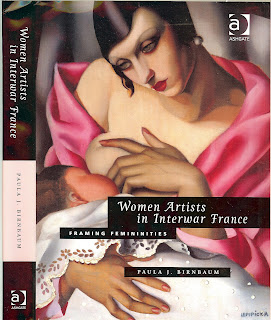In early 1934, a government official from Geneva named John Albaret opened an exhibit of Swiss women artists by asserting that to date there had been no great women artists. He indicated that wifehood and motherhood was women’s most important role – and that, given the obligations of these roles, wives and mothers could never become “artists of genius.” Albaret did acknowledge, however, that as more and more women did not marry, some were indeed showing promise in the arts. He hoped that some would soon display their creative genius. Implied in his introduction, was that no women had done so to date.
Some women artists were highly offended by Albaret’s analysis. Marie-Anne Camax-Zoegger (1887-1952), the Parisian artist and founder of Femmes Artistes Modernes (a collective of women artists) and the mother of five, replied to the Swiss official as follows:
Maternity and art are two different things that in no way detract from one another. There are very great women artists who are not married, and there are others who are married and who have been admirable mothers. I believe that the more cultured a woman is, the more worthy she of raising her children. Maternity does not diminish her art, and Art does not erode her capacity to mother.To illustrate her point, Marie-Anne Camax-Zoegger invoked the examples of Mme Vigée Lebrun, the celebrated French court painter of the late 18th century, who “exalted maternal tenderness,” of Berthe Morisot, who had several children and painted with the Impressionists, and of Camax-Zoegger’s near-contemporary Suzanne Valadon, whose son Maurice Utrillo had also become a great French artist.
“I know from experience,” Camax-Zoegger wrote, “that children do not detract from one’s art; they renew its vigor. For a woman they are the immortal fountain from which she is able to draw tenderness and life.”
What do Clio’s 21st century readers have to say about this debate? From the perspective of your own culture, what response would you make to the question of whether or not mothers can be artistic geniuses?
Source: “Attendons avec patience les artistes de génie, que les femmes nous donneront avec le temps,” Comoedia, 8 Nov. 1934; “Deux femmes artistes répondent au Conseiller de Genève qui plaça l’art féminin au-dessous de l’art masculin,” Comoedia, 24 Nov. 1934. See Paula J. Birnbaum, in Women Artists in Interwar France (Ashgate, 2011), p. 36. Translations from Camax-Zoegger lightly amended by Clio.

